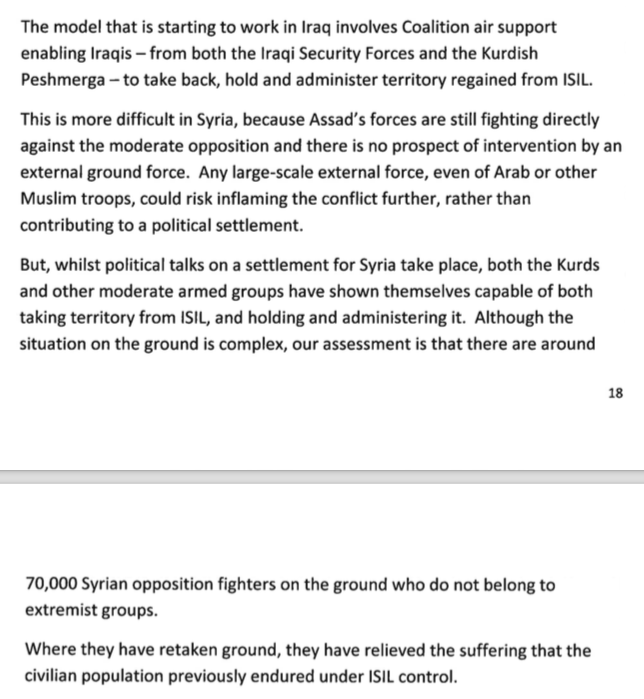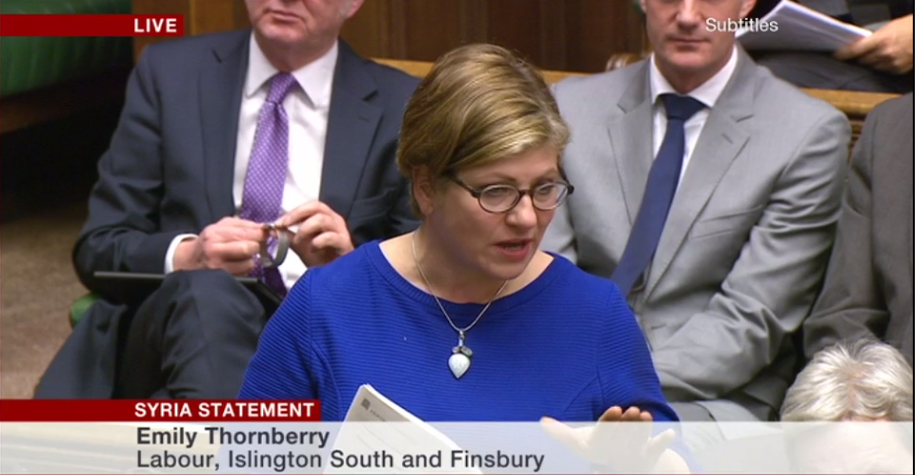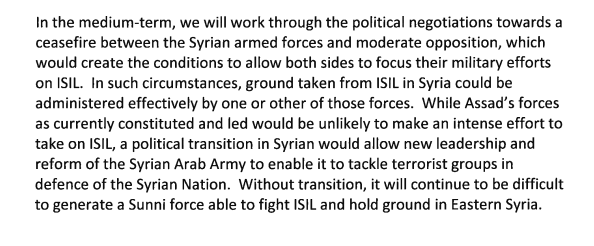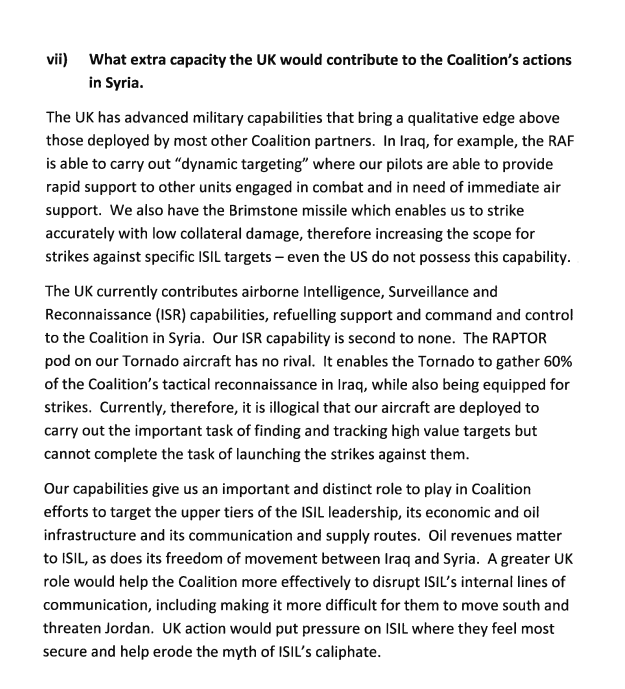
David Cameron has appealed to MPs to back military action against ISIS in Syria, asking: "If not now, when?"
The prime minister said it was "morally" wrong to "shirk our responsibility" and leave the US, France, and other allies to fight the terrorists.
In a statement to a hushed House of Commons, Cameron said his "first responsibility" was to keep British people safe, adding: "The reason for acting is the very direct threat that ISIL poses to our country and our way of life."
He conceded that ISIS – also known as ISIL and Daesh – would not be defeated by airstrikes alone, but said allied forces would be helped by around 70,000 Syrian opposition fighters on the ground. And he denied that British combat troops would be deployed in the conflict.
"We shouldn't be content with outsourcing our security to our allies," Cameron said. "If we won't act now, when our friend and ally France has been struck in this way, then our friends and allies can be forgiven for asking: If not now, when?"
The PM said terrorists needed to be hit "in their heartlands right now". But he said a Commons vote would not happen unless there was "a clear majority for action, because we will not hand a publicity coup to ISIL".
Yet he faced repeated questions from sceptical MPs about the 70,000 figure, which he said was based on assessments from the joint intelligence committee. Tory chair of the defence select committee Julian Lewis said the figure was a "revelation" to him, while another Tory, Edward Leigh, described the Free Syrian Army as a "ragbag".
A vote on military action in Syria is expected next week after MPs have had the weekend to think it over. It follows the devastating terror attacks in Paris earlier this month, which saw 130 people murdered.
Labour's shadow cabinet met for 90 minutes to discuss its position on Syria after the statement. There was speculation that most members backed airstrikes in Syria. But shadow international development secretary Diane Abbott said no decision had yet been reached on whether to allow Labour MPs a free vote.

Tory MP Crispin Blunt, chair of the foreign affairs select committee – which has urged caution over airstrikes – said he was now ready to back military action.
In a big win for the PM, Blunt said: "It is now my personal view that, on balance, the country would be best served by this house supporting his judgements that the UK should play a full role in the coalition, to best support and shape the politics, thus enabling the earliest military and eventual ideological defeat of ISIL."
Tory former cabinet minister Ken Clarke also lent Cameron his backing.
But Labour leader Jeremy Corbyn kept his cards close to his chest. He did not make clear whether he would tell his MPs to back the airstrikes, choosing instead to ask a number of detailed questions about the possible action.
He said there was "no doubt" that ISIS was a threat to British people. But he added: "The question must now be whether extending the UK bombing from Iraq to Syria is likely to reduce or increase that threat, and whether it will counter or spread the terror campaign ISIL is waging in the Middle East."
Corbyn also warned against "mission creep" that could see British boots on the ground.
Tory MP Julian Lewis, chair of the defence committee, said he was not yet convinced by the PM's claims. He cast doubt on Cameron's claim of 70,000 Syrian troops on the ground, as did senior Tory MP Peter Lilley.
Lewis has tabled a parliamentary question for Cameron, asking him to list all the main groups comprising the 70,000 moderate fighters in Syria.
Chair of Defence Committee Julian Lewis to table Q for PM asking for details of 70k Syrian fighters
Cameron also published a 36-page response to the foreign affairs committee's concerns over the UK's plans for military intervention.
The committee had raised a series of questions including what Britain could add to a campaign that already involved the US, France, and Russia and how ground forces will be involved, and asked for detail about a plan for transition in Syria.
In the document, the PM said there was a clear legal basis for the UK's intervention, writing that "force may lawfully be used in self-defence".

Cameron included the assessment from UK intelligence chiefs that "there are around 70,000 Syrian opposition fighters on the ground who do not belong to extremist groups".

Cameron gave more detail on this in his Commons statement:
As the report I'm publishing today shows we believe there are around 70,000 Syrian opposition fighters, principally the Free Syrian Army, who do not belong to extremist groups and with whom we can coordinate attacks on ISIL.
In addition there are the Kurdish armed groups who have also shown themselves capable of taking territory, holding territory and administering it – and crucially relieving the suffering that the Syrian population had endured under ISIL control. The Syrian Kurds have successfully defended Kurdish areas in northern Syria and retaken territory around the city of Kobani. Moderate armed Sunni Arabs have proved capable of defending territory north of Aleppo and they stopped ISIL's attempts to capture the main humanitarian border crossing with Turkey and sweeping into Idlib province.
In the south of Syria the southern front of the Free Syrian Army has consolidated its control over significant areas and has worked to prevent terrorists from operating. These people I've talked about, they are ground troops. They need our help. When they get it they succeed. So in my view we should do more to help them from the air.

But some MPs questioned whether there really were 70,000 troops ready to help.
Senior Tory MP Julian Lewis said: "The suggestion there are 70,000 non-Islamist, moderate, credible ground forces, I have to say, is a revelation to me and I suspect most other MPs in this house."
Cameron said the 70,000 figure was the "considered opinion" of the independent joint intelligence committee. He added: "That document has been entirely cleared by them, as has my statement.
"Of course, you and I agree that in time the best ground troops should be the Syrian army. My view is that will be more likely to happen after a political transition has taken place in Syria."
Tory former minister Peter Lilley said: "I want you to convince me that what you refer to as the Free Syrian Army actually exists rather than is a label we apply to a ragbag group of clans and tribal forces with no coherent force."
Tory MP John Baron added: "I would ask you to look again at your figure of 70,000 Free Syrian Army, because we have been told very directly through recent contact there are very few moderates remaining on either side of this civil war."
And Labour MPs raised fears too. Emily Thornberry said the case for airstrikes was "very thin", adding: "These ground troops you talk about, the 70,000 moderate Sunnis, seem to be in the wrong place, there's some question about whether they really exist."
Liam Byrne also warned that the Free Syrian Army would "find it difficult" to take big cities in Syria without support.
Charles Lister, an expert on the Syrian crisis said on Twitter that the 70,000 figure was "about right".
Cameron's document stated that the UK would ultimately work to build a ceasefire between Assad's regime and opposition forces.

Detailing how the UK could contribute to the ongoing military campaign, Cameron said the RAF is able to strike targets with more precision "with low collateral damage", adding that it has enhanced reconnaissance technology.

The PM also made it clear that Britain's involvement is explicitly not aimed at targeting Assad but about tackling the threat to the UK from ISIS.


